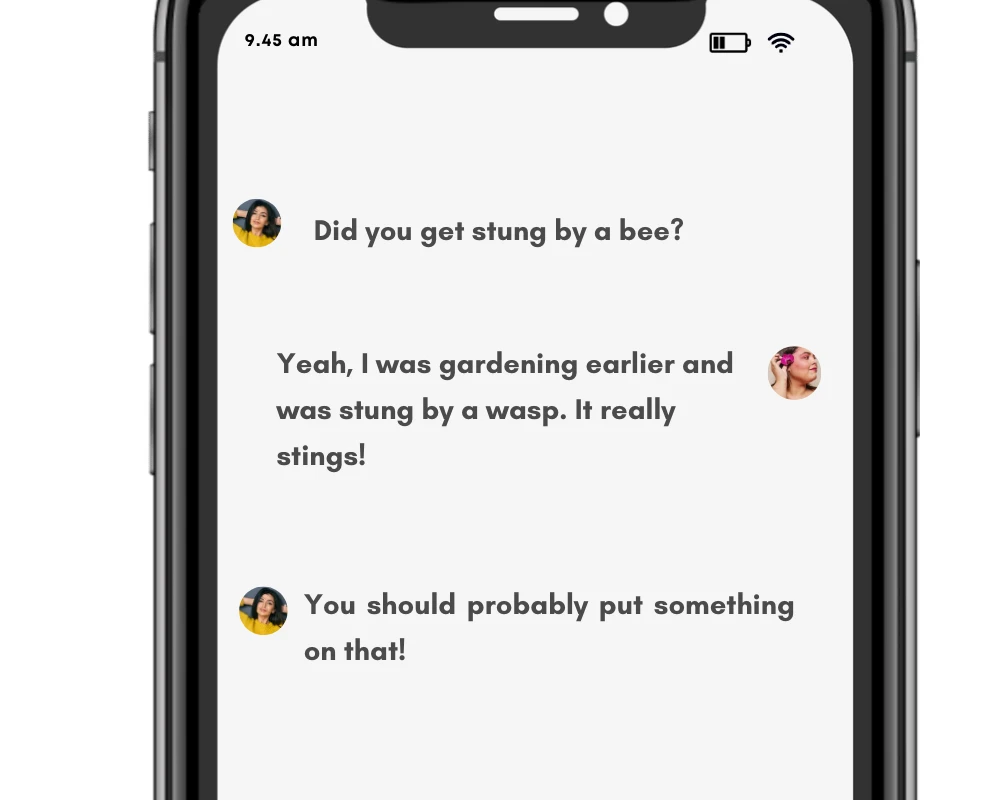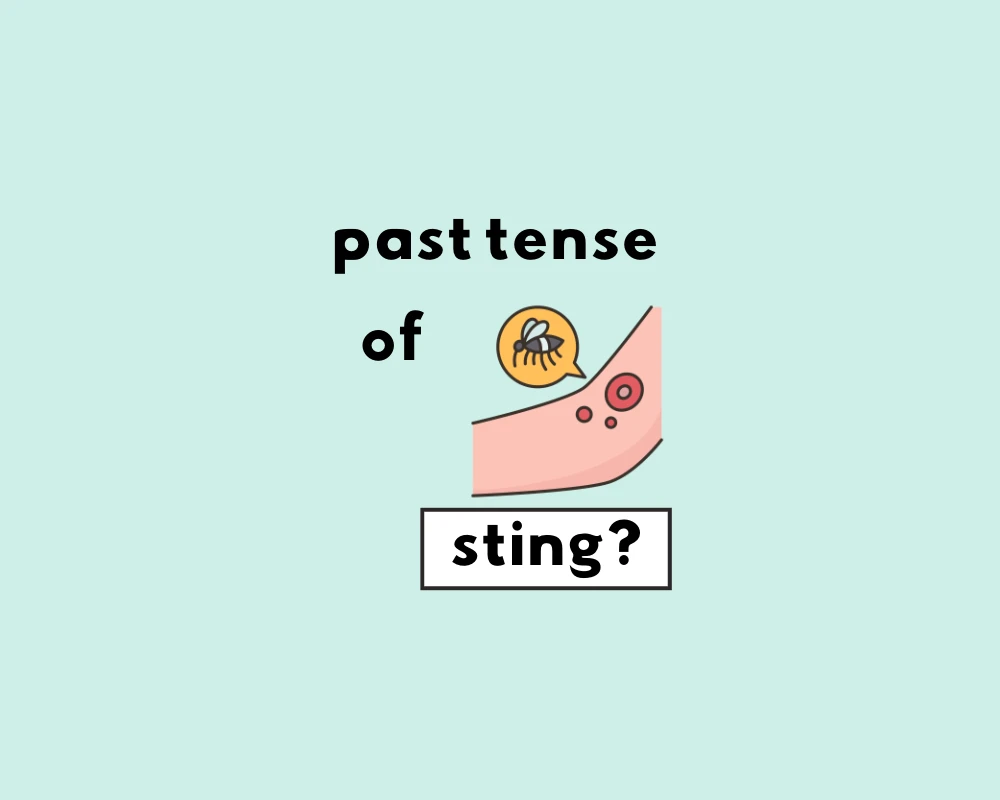
What’s the meaning of ‘sting’?
It’s sing, sang, sung, and ring, rang, rung, so shouldn’t it also be sting, stang, stung? Not too fast, says the rules of English verb conjugations—sting doesn’t work this way.
The verb sting means “if an insect or an animal stings you, it hurts you by sticking a sharp part of its body into your skin”. In conversation, you might say ‘don’t go too close to those bees, otherwise they’ll sting you.’
Verb forms of “sting”
| present | past | future | |
| simple | I sting | I stung | I will sting |
| continuous | I am stinging | I was stinging | I will be stinging |
| perfect | I have stung | I had stung | I will have stung |
| perfect continuous | I have been stinging | I had been stinging | I will have been stinging |
1. Sting is the present tense: Be careful of the nettles—they sting!
2. Stinging is the present participle: My eyes are still stinging from the saltwater.
3. Stung is the simple past: Hail stung their faces.
4. Stung is also the past participle: He was stung into making a cheap retort.
When to use sting vs. stung
Compare these sentences:
Past tense: A bee stung my arm.
Past participle: She was stung with remorse.
What’s the difference between the past tense and the past participle form of a verb? With verbs that share the same form between their past tense and past participle (such as sting/stung, stick/stuck; buy/bought, catch/caught; and lose/lost), we can tell which form of the verb is used based on whether there is an auxiliary verb in the sentence.
The main auxiliary verbs are
Modal auxiliary verbs
There are also modal auxiliary verbs, which reflect different modes of being or mental states like intent, necessity, will, and possibility:
- can,
- could,
- may, might,
- must, shall,
- should, will, and would.
The presence of any of these auxiliaries with the past participle form of a verb is the key indication that it is indeed the past participle form in use, rather than the simple past tense verb form. At an abstract level, try to think of what past participles paired with auxiliaries allow in terms of our interpersonal communication, and communication in general, that the simple past tense does not provide. Let that one marinate for a while.
“Sting”, used in sentences
1. The bees will sting if you bother them.
2. The iodine will sting for a few minutes.
3. Be careful of the nettles—they sting!
4. They launched a stinging attack on the government. (present participle)
5. His arm was covered with bee stings.
“Stung”, used in the past tense, in sentences
1. Hail stung their faces.
2. I was stung on the arm by a wasp.
3. Their cruel remarks stung her into action.
4. The jellyfish stung the swimmer.
5. I got stung by a bee.
“Stung”, used as a past participle, in sentences
1. She was stung with remorse.
2. He was stung by their criticism.
3. Taunts from the fans stung him into his best performance of the season.
4. He was stung into making a cheap retort.
5. He was stung into answering in his defence.
Sting, synonyms
- tingle
- prick
- pain
- itch
- sore
- discomfort
Idioms with sting
| phrase | meaning |
| float like a butterfly, sting like a bee | to be graceful but powerful; this phrase was coined by the famous boxer Muhammad Ali! |
| sting like the devil | for something to sting or hurt intensely |
| take the sting out of something | to make a situation less bad or unpleasant |
| a sting in the tail | something that may seem good but has an unpleasant result or outcome |
| sting (one) to the quick | to emotionally upset or hurt someone |
Origin of the verb sting
From etymology online on sting (v.):
Old English stingan “to stab, pierce, or prick with a point” (of weapons, insects, plants, etc.), from Proto-Germanic *stingan.
Read about other verb conjugations!
- What’s the past tense of spread?
- What’s the past tense of lead?
- What’s the past tense of choose?
- What’s the past tense of fly?
- What’s the past tense of lay?
- What’s the past tense of drive?
- What’s the past tense of draw?
Sources
- Harper, Douglas. “Etymology of sting.” Online Etymology Dictionary, https://www.etymonline.com/word/sting. Accessed 16 January, 2023.
- “Sting.” Farlex Dictionary of Idioms. 2015. Farlex, Inc 16 Jan. 2023 https://idioms.thefreedictionary.com/sting
- “Sting.” Merriam-Webster.com Dictionary, Merriam-Webster, https://www.merriam-webster.com/dictionary/sting. Accessed 16 Jan. 2023.
Work Sheet
What is the correct simple past tense of the verb “sting”?
According to the blog post, which sentence correctly uses the simple past tense of “sting”?
What does the verb “sting” primarily mean when referring to an insect, according to the post?
Which of the following is NOT a form of the verb “sting” mentioned in the blog post?
How can you often tell if “stung” is being used as a past participle form rather than the simple past tense form?
Be careful of those plants—they !
My eyes are still from the smoke.
The wasp me on the hand.
He was by a jellyfish while swimming.
Their cruel words really her.
Frequently Asked Questions
What is the past tense of ‘sting’?
+
Is ‘stang’ the past tense of ‘sting’?
+
What does the verb ‘sting’ mean?
+
How do I know if ‘stung’ is past tense?
+
How do I know if ‘stung’ is past participle?
+
Yash, D. "What’s the Past Tense of the Verb ‘Sting’?." Grammarflex, Jun 20, 2025, https://www.grammarflex.com/whats-the-past-tense-of-the-verb-sting/.











